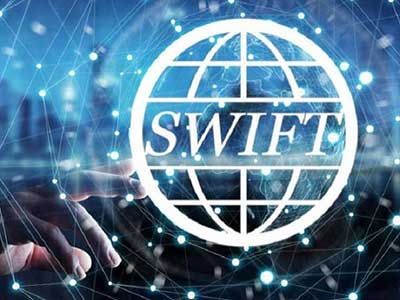Relevance: GS-2: Important International institutions, agencies and fora- their structure, mandate.
Key phrases: SWIFT, Standard encryption, Financial messaging system, SPFS, Blockchain, cross-border settlements.
Why in News?
- Exclusion from SWIFT, a very discreet but important cog in the machinery of international finance, is one of the most disruptive sanctions the West has deployed against Russia for its invasion of Ukraine.
Context:
- The US and European Union (EU) have decided to partially exercise the nuclear-weapon option as far as economic sanctions are concerned: cutting off a number of Russian banks from the main international payment gateway, SWIFT. The assets of Russia’s central bank are also expected to be frozen, constraining Moscow’s ability to access its overseas reserves.
- The intention of the moves is to “further isolate Russia from the international financial system”, a joint statement stated.
- The measures were backed by the United States, Canada, the European Commission, Britain, France, Germany and Italy. The group of world powers said in a statement it was "resolved to continue imposing costs on Russia that will further isolate Russia from the international financial system and our economies."
What is SWIFT?
- The SWIFT system stands for the Society for Worldwide Interbank Financial Telecommunication and is a secure platform for financial institutions to exchange information about global monetary transactions such as money transfers.
- SWIFT banking system was founded on May 3, 1973 in Brussels under the leadership of its inaugural CEO, Carl Reuterskiöld.
- While SWIFT does not actually move money, it operates as a middleman to verify information of transactions by providing secure financial messaging services to more than 11,000 banks in over 200 countries.
- Based in Belgium, it is overseen by the central banks from eleven industrial countries: Canada, France, Germany, Italy, Japan, the Netherlands, Sweden, Switzerland, the United Kingdom, and the United States, besides Belgium.
- Standard encryption is applicable to messages sent via SWIFT to ensure its safety.
- SWIFT ensures secure transport of financial messages. It does not hold accounts for its members and nor does it perform any form of clearing or settlement.
- The SWIFT bank system also sells software and services to financial institutions, mostly for use on its proprietary "SWIFTNet" and ISO 9362 Business Identifier Codes (BICs), which are popularly known as "SWIFT codes".
- SWIFT is an international system, similar to gmail for banks and international financial institutions, used to send written messages, including orders and confirmations for payments, trades and currency exchanges.

Is Role of SWIFT important for a Country?
- The crucial role of SWIFT can be determined by the fact that when some Iranian banks were cut off from SWIFT in 2012, Iran's oil exports plummeted sharply from more than 3 million barrels a day in 2011 to about 1 million barrels a day a few years later.
- When Russia was threatened to be cut off from SWIFT in 2014, Alexei Kudrin, Russia’s former finance minister, warned about a potential GDP contraction of 5% due to such a move. Although, the sanction never came into realisation. Russia accounted for 1.5% of total transactions on Swift in 2020.
Is there an alternative to SWIFT?
- Since 2014, Russia has run its own financial messaging system for Russian and foreign banks. It has developed an alternative messaging system called SPFS (Financial messaging system of the Bank of Russia) which handles about a fifth of domestic payments. It has only 400 users. “This is a reliable and secure channel for sending electronic messages on financial transactions," Russia's central bank says in a note.
- SPFS is the financial messaging system of the Bank of Russia. The system is not as advanced and secure as SWIFT.
What are the challenges for SWIFT?
- A central challenge for SWIFT is its large volume of transactions and associated costs. It’s not practical for banks to manually enter instructions for each transaction. Today, SWIFT provides software to automate these processes, but at a high cost. If SWIFT can find a more cost-effective way to deliver automation at scale, it will solve a major challenge for its clients.
- The other main challenge to SWIFT comes from blockchain and cryptocurrency, which were invented in 2008 and have grown in popularity since. In the same way that SWIFT replaced Telex in the 1970s, blockchain now presents a viable alternative to SWIFT for cross-border transactions in the 2020s.
- However, the system is not infallible, and is vulnerable to hacking by extraneous agents, as was the case in the heist of $81 million from Bangladesh’s central bank, and also as bank insiders, who can manipulate the system at the bidding of rogue clients.
Way forward:
- Traditionally, cross-border settlements happen in approximately 3-5 days. This is because of the swift process, and its involvement of an intermediary. With Blockchain however, the transaction is almost instant.
- Fintech companies continue to introduce pioneering technologies that are having an unquestionable effect on the current global financial industry. Alongside this, Blockchain technologies will continue to be at the forefront of corporate think tanks, and the implementation of some form of distributed ledger networks is almost inevitable.
- With this in mind, SWIFT are really forced to adopt a new technology or indeed use the global payments initiative to further address issues that are being faced by corporates all around the world.
Source: The Hindu BL
Mains Question:
Q. Discuss the role of SWIFT to achieving secure and real-time payments internationally by bridging multiple currency systems and regulatory jurisdiction. Examine.








